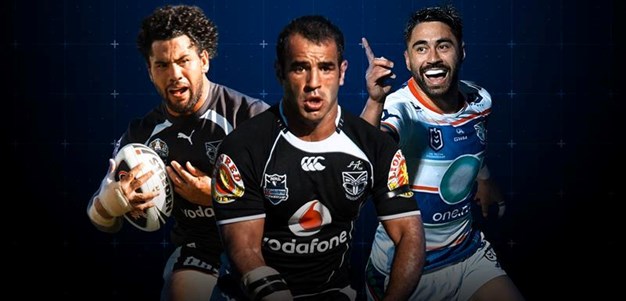It looks like you may be using adblocking software to view this site.
Many features on the site, such as video playback, may not work properly when using adblocking software.
Please whitelist our domain or disable your adblocker to access all features and videos.
Gold Coast Titans' new ownership
“The most important piece of real estate is between your ears. Don’t let cheap people rent it out”.
This message was delivered by former Organised Crime Investigations chief Tony Parsons to more than 140 NRL hopefuls attending the 2018 Rookie Camp at University of Wollongong on Friday and Saturday.
Parsons was among the guest speakers from within and outside the game, including former Seattle Seahawks NFL defensive tackle Jesse Williams, who spoke to the rookies from each of the 16 clubs about the opportunities and pitfalls associated with being an NRL player.
Other speakers included past and present NRL stars Joel Thompson, Dene Halatau, Reni Maitua (alcohol and your choices), Clinton Toopi, David Solomona, Luke Kelly (respectful relationships), Alan Tongue, Matt Ballin (personal brand), Shaun Spence (concussion) and Ben Creagh (finance).
The players also heard from RLPA general manager of player relations Clint Newton about the new collective bargaining agreement but the main focus of the two-day camp was on how to cope with the pressures of playing in the NRL while avoiding problems that could jeopardise their career.
Parsons, who began his police career alongside Peter Jackson - the former Test and State of Origin star who died from a heroin overdose - outlined how cannabis, cocaine, ecstasy, ice and heroin are produced and the health risks associated with illicit drug use.
“If not already, each and every one of you will be exposed to the temptation or use of recreational drug use,” Parsons told them in hard-hitting presentation in which he also explained details of the international drugs trade and why sports stars are targets for organised crime.
“Now that you are playing in the NRL you have got a massive target on your back because you have got a brand and these people want to be associated with you. It is coming your way and you have to have the fortitude to stand there and say not me.
“The NRL is an avenue for you to do the very best in life but for every kid who is sitting here there are hundreds of others who want your shirt so you have got to make the most of that opportunity.”
Protecting their brand was a common theme in many of the presentations, including that by Williams, who told the players he had never drunk alcohol or smoked.
Hugh Van Cuylenburg from the Resilience Project spoke about the gratitude, empathy and mindfulness program credited by Richmond Tigers superstar Dusty Martin for his remarkable AFL season in which he won almost every award on offer as well as a premiership.

“You are in the NRL and you are living the dream and we are still complaining about little things like money for petrol but we’ve got it all compared to so many other people,” 17-year-old Parramatta Eels halfback Dylan Brown said.
“Jesse Williams mentioned about staying true to yourself and that resonated with me because I am from New Zealand so never changing, going back to family and keeping in contact with them is important.”
Cronulla’s Kyle Flanagan said: “Jesse Williams was great, I learned a lot from him and it’s pretty good to hear from past players who have played so many games about the ins and outs of the NRL. There is a lot about your own values, where your values came from and sticking by them, and it is good to learn from other people’s experiences as well.”
The first NRL Rookie Camp was held in 2006 and has since been an annual event for players in their first season.
“Essentially the information we provide is to help them understand that there is process and consequence to actions,” Holden Cup wellbeing and education programs manager Tony McFadyen said.
“For us it about minimising risk because we know there is a lot of crucial decision making at a critical time in their lives. They are going to be confronted with it so we want to give them the tools and information to help them make the right choices.”
Newton said the RLPA believed it was important for the rookies to understand the environment they were entering and know the opportunities the game could give them.
“What we are trying to do here in partnership with the NRL is ensure that these guys get an understanding of what they are coming in to, what the expectations are, what they are entitled to and some of the tools to work through the varying complexities that exist within the game and outside the game,” he said.
“Nothing comes for free anymore and you have got to work hard. Rugby league is like any other profession out there in that you get out what you put in and that is what these guys have got to understand.
“You can make a really good living playing rugby league and there is a level of professionalism around their employment now with mandatory time off, educational grants and educational allowances and time to invest in themselves but it still comes back to their involvement.”




